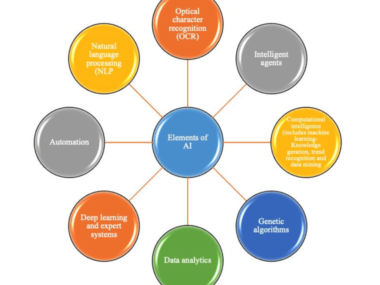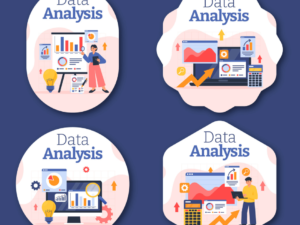Guide to AI Tools. In today’s digital world, AI tools are essential. They boost efficiency and decision-making in businesses.
These tools use machine learning, data analysis, and automation. They are reshaping industries by doing tasks that usually require human intelligence. But they do it at unmatched speed and scale.
AI tools are key to business growth and competitiveness. They power chatbots that enhance customer service and algorithms that predict market trends. As these technologies evolve, it is crucial to learn to use AI tools. They have great potential, and many want to capitalize on it.
This post explores the vast world of AI tools. It shows their skills, uses, and trends shaping tech’s future in business.
Table of Contents About Comprehensive Guide to AI Tools

What Are AI Tools?
AI tools are advanced apps that use AI. They automate, optimize, and improve many business processes. They use machine learning, data analysis, and natural language processing. These tools perform tasks that would usually require human intelligence.
These tasks include customer service and complex data analysis. They also include decision-making. For instance, AI chatbots can handle customer queries. They provide instant, 24/7 responses.
It boosts customer satisfaction by reducing wait times. It also lets human employees focus on complex issues.
AI-driven analytics tools can sift through massive datasets. They can find trends, make predictions, and provide insights. These capabilities enable businesses to make informed decisions quickly and accurately.
Moreover, AI tools are not limited to digital interactions and data crunching. They extend to physical tasks through robotic process automation (RPA). It automates routine, repetitive tasks in industries such as manufacturing and logistics.
This automation increases efficiency and reduces the likelihood of human error. AI tools can boost productivity, accuracy, and innovation in businesses. This makes AI tools indispensable in today’s technology-driven market.
Types of AI Tools
AI tools vary widely, each suited to different tasks and industries. Here’s a breakdown of some key types:
- Data Insights and Machine Intelligence Tools: These tools analyze large data sets. They predict trends and outcomes. For example, Tableau visualizes data trends to aid business decisions.
- Natural Language Processing (NLP) Tools: These understand and generate human language. Example: Google’s BERT helps improve how machines understand user queries on search engines.
- Robotic Process Automation (RPA): Automates repetitive, rule-based tasks that require manual input. UiPath automates clerical tasks. This frees humans to tackle complex problems.
- AI-Powered Customer Service Tools: Enhance customer interaction with automated responses. Example: Freshdesk AI streamlines customer queries and improves response times.
- AI Marketing Tools: Automates and personalizes marketing campaigns. Example: HubSpot uses AI to automate email marketing, offering personalized content to users.
AI Writing Tools
AI writing tools are changing content creation. They assist writers in many genres and formats. These tools use AI to help with many writing tasks. They range from drafting emails to creating complex reports and blog posts.
Capabilities of AI Writing Tools:
- Content Generation: AI writing tools can generate ideas, suggest fixes, and draft articles based on prompts.
- Grammar and Style Enhancement: These tools can fix grammar, improve style, and ensure consistency. They are invaluable for both novice and professional writers.
Applications and Benefits:
- Efficiency: AI writing tools can greatly speed up writing. They automate routine tasks like researching, drafting, and editing.
- Creativity Boost: These tools can inspire writers and help with writer’s block. By suggesting ideas and phrasing, they boost creativity.
- Accessibility: AI tools make quality writing more accessible. They help those with language barriers or learning disabilities express themselves clearly.
Choosing the Right AI Writing Tool: Consider three things when choosing an AI writing tool. Your writing style, how much control you need, and software compatibility. Also, check the tool’s privacy policy, especially for sensitive content.
AI writing tools are not just about replacing human creativity but enhancing it. They offer a new, efficient way to write. They make writing more accessible.
They also allow for personal expression and style. For work or personal use, these tools can change how we write and communicate ideas.

Factors to Consider When Choosing AI Tools
When choosing AI tools, consider several factors. They must align with your business needs.
- Business Needs: Identify the specific problems you need the AI tool to solve.
- Ease of Integration: Check how well the tool integrates with your systems.
- Scalability: Ensure the tool can handle your business’s growth.
- Cost: Consider both initial and ongoing costs of the tool.
- Support and Updates: Look for tools that offer reliable support and frequent updates.
Common Applications of AI Tools
AI tools are employed across various industries due to their versatility:
- Automation of Repetitive Tasks: AI simplifies tasks like data entry and scheduling.
- Customer Service: AI chatbots can provide instant responses to customer inquiries.
- Data Analysis: AI analyzes big data to provide insights that inform strategic decisions.
- Marketing and Sales: AI optimizes marketing efforts and personalizes customer interactions.
- Healthcare: AI assists in diagnostics and patient management.
Why AI Tools are Important for Businesses
AI tools bring numerous advantages to businesses aiming to enhance their operations.
- Increased Efficiency: Automating routine tasks frees up time for strategic activities.
- Cost Reduction: AI reduces the need for manual labor, lowering operational costs.
- Improved Decision-Making: AI analyzes data to provide insights. It improves decision-making.
- Scalability: AI handles increased workloads without needing more human resources.
- Enhanced Customer Experience: AI tools provide customers with personalized services. This boosts satisfaction and retention.
Key Trends in AI Tools (2024) / AI Tools Guide
Several trends highlight the growing importance of AI tools in the business landscape:
- AI-Powered Robotics: Increasingly used in manufacturing for precision and efficiency.
- Advanced NLP: Improving how machines understand and respond to human language.
- RPA and AI Integration: Combining RPA with AI to tackle more complex tasks.
- Hyperautomation: Employing AI across all levels of processes for maximum efficiency.
- AI in Cybersecurity: Using AI to proactively detect and respond to security threats.

How to Maintain AI Tools for Optimal Performance
Effective maintenance of AI tools is crucial for their longevity and effectiveness.
- Regular updates: Keep software up to date to enhance functionality and security.
- Data Management: Ensure the data fed into AI tools is accurate and relevant.
- Performance Monitoring: Conduct frequent checks of performance metrics and make adjustments as necessary.
- Security Measures: Implement robust security protocols to protect AI tools from cyber threats.
How to Get Started with AI Tools
Implementing AI tools can seem daunting, but these steps can simplify the process:
- Assess Needs: Clearly define what you need the AI tools to achieve.
- Research: Look into different tools to find those that best meet your needs.
- Training: Educate your team on how to use the AI tools effectively.
- Seek expertise: Consult with AI professionals for insights on implementation and optimization.
Takeaways and Practical Tips
Here’s what to remember about AI tools:
- They streamline operations, reduce costs, and enhance decision-making.
- It’s important to choose AI tools that align with your specific business needs.
- Regular maintenance and updates are crucial for keeping AI tools effective.
Practical tips:
- Start small with AI tools to see what works for your business.
- Regularly review AI tool performance and adjust strategies as needed.
AI Tools Software
AI tools software includes applications that use AI for various tasks. These range from automating routine processes to extracting insights from data. These tools are key. They streamline operations, boost productivity, and drive innovation across many sectors.
Key Features and Functions:
- Automation: AI software automates tasks like data entry and chatbot support. It also manages networks and performs predictive maintenance. This saves time and reduces human error.
- Data Analysis: Many AI software tools can analyze data effectively. They use machine learning to quickly process large datasets, offering businesses useful insights.
Industry Applications:
- Healthcare: In medicine, AI software diagnoses diseases from imaging scans. It is faster and more accurate than traditional methods.
- Finance: AI software detects fraud and assesses risk. It analyzes transaction patterns and customer data to find risks and anomalies.
- Marketing: AI tools can analyze consumer behavior. They can then personalize marketing campaigns. This greatly boosts engagement and conversion rates.
Choosing the Right AI Tools: When picking AI software, check its compatibility, ease of use, and scalability. Also, check the provider’s support. It’s vital to choose a tool that fits your needs and can grow with your business.
AI tools are transforming industries. They provide powerful software that automates and optimizes processes. Using these tools, businesses can be highly efficient and innovative. This will make them leaders in the digital age.
FAQ: Comprehensive Guide to AI Tools
What are AI tools, and how do they benefit businesses?
AI tools are software that use AI. They automate tasks, analyze data, and improve decision-making. These tools are vital for businesses. They want to boost efficiency, cut errors, and gain a competitive edge.
How can I choose the right AI tool for my business?
Selecting the right AI tool depends on your specific needs. Consider your data’s size, the task’s complexity, and your industry. A guide to AI tools can compare and recommend them for different business needs.
Where can I find more information about implementing AI tools?
For a deeper dive into AI tools, check out Amazon. You can find books and software there. Also, check tech blogs on Hostinger. Additionally, for budget-friendly options, explore AliExpress.
What are the latest advancements in AI tools?
Recent AI tools have advanced. They’ve improved machine learning algorithms, integration with existing systems, and natural language processing. These changes provide more accurate, timely insights.
How do AI tools integrate with existing business processes?
AI tools can be integrated into existing business processes via APIs and middleware. They enable seamless data flow and functionality across platforms. This integration enables businesses to leverage AI capabilities without overhauling their current systems.
What should I look for in AI tool providers?
When choosing AI tool providers, consider their:
- industry expertise
- solution scalability
- customer support
- user reviews
External links to expert reviews and user testimonials can help. They are useful for making an informed decision.
Conclusion on Comprehensive Guide to AI Tools
AI tools are more than tech advancements. They are vital tools, revolutionizing how businesses operate worldwide.
The future demands AI in daily business tasks. It boosts efficiency, cuts costs, and creates great customer experiences.
AI tools help businesses make smarter, data-driven decisions. They do this by automating mundane tasks and providing deep insights. These decisions can dramatically improve business outcomes.
By keeping up with AI’s latest developments, businesses can thrive in the digital age. Embracing these innovations will help them harness AI’s full potential.
Embrace AI tools now. They will give you an edge in tomorrow’s business world. They will ensure your growth and success. For mundane tasks or providing deep analytical insights, AI tools empower businesses to make smarter, data-driven decisions that can dramatically transform their outcomes.
By staying abreast of the latest AI developments and embracing these innovations, businesses can harness the full potential of AI to not only survive but thrive in the competitive digital age.
Embrace AI tools now to secure a leading edge in tomorrow’s business landscape, ensuring continued growth and success.





